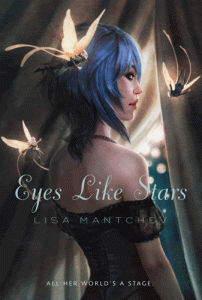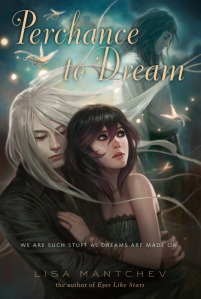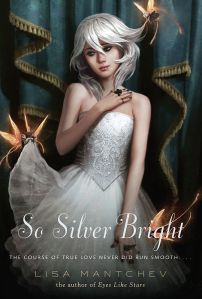Remember when I wrote this article? Well, my review was a bit incomplete. At the time, I had read the Circle books at least ten times a piece and only a handful of Tortall books. To be honest, I went about the Tortall books nearly backwards! I started with Daughter of the Lioness (Trickster’s Choice and Trickster’s Queen) which told the adventures of Alianne of Pirate’s Swoop, daughter of Alanna the Lioness and Baron George Cooper. Because of that, I already knew which way many relationships worked out from previous quartets I had not read. At the time it didn’t phase me because I was so focused on Aly. I didn’t realize that I was reading spoilers! The knowledge that I gleaned from the Trickster books gave me an interesting perspective for reading the Song of the Lioness, The Immortals, and the Protector of the Small Quartets. I already knew where these characters would end up, just not how they got there. In a way, this made me even more interested in reading these earlier books.
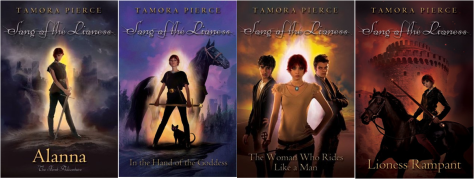
Tamora Pierce creates role models for girls with her strong female characters (though boys will love her books, too). She started with Alanna, a young girl whose ambition was to become a knight. She and her twin brother, however, were not to have what they truly wants as far as their father was concerned. Thom was to become a knight though he wanted to become a great sorcerer, and Alanna would become a lady, good for nothing but marriage and learning to run a fief. Alanna schemed to trade places with her brother, giving them both the chance that they wanted. Things would be easier for Thom, boys were often sent to the convent to be cared for until they were old enough to be trained in magic. Alanna, however, would have to hid her sex for eight years, pretending to be a boy throughout her Page and Squire training. Once she claimed her shield, then she would reveal the truth before running off to adventure. In a world where to be a woman is to be weak, Alanna proves otherwise. She soon discovers that her path is watched by the Goddess, who protects and offers help to Alanna when she can.
As an early series, the writing is not as polished as the Beka Cooper series or Will of the Empress. The pace is lightning quick, covering four years in just over a hundred pages in the first and second books (Alanna – The First Adventure covers Page training and In the Hand of the Goddess covers Squire training) and roughly a year in each the third and fourth books (The woman Who Rides Like a Man and Lioness Rampant). There are moments that move too quickly, like the friendship with Rogue George Cooper, while other moments feel drawn out– the confrontation between Alanna and Duke Roger of Conté lasted almost a decade, for example. Granted he was the main villain, so-to-speak, and he was driving the story on, I just felt like in a confrontation that long, the villain should be more present and perhaps trying harder to get in the heroine’s way. Song of the Lioness is still a great story with a positive message not only for girls, but for anyone who’s afraid to go after what they want. If you want it badly enough, the risks are worth it.
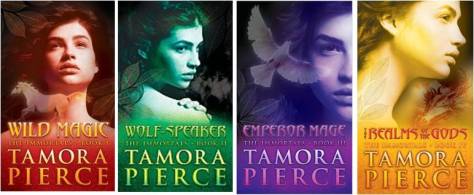
The Immortals takes place almost a decade after Lioness Rampant and is centered on Daine, an orphan girl whose mother and grandfather were killed by raiders. She is left without a clue as to who her father is. She lives in fear of a madness that she doesn’t understand, an ability to become one with animals and forget her humanity. As she tries to escape the village that now wants her dead in order to cleanse the madness she suffers from, she becomes involved with the lives of Alanna and her costars from Song of the Lioness. It isn’t long before she learns that the madness is really uncontrolled Wild Magic. The Great Mage Numair takes her under his wing and teaches her how to connect with her magic and how to keep her humanity. This same year, Daine also faces an onslaught of Immortals that were released from their imprisonment in the Divine Realms. They begin to fight creatures like Spidrens (human-spider hybrids), Stormwings (human-bird hybrids with razor sharp metal feathers and claws), and learning more about creatures that would rather help– Ogres, Dragons, and Basilisks– the kingdom must find out how these dangerous beings were released and how some of their neighboring countries escape the violence the Immortals visit upon the land. Daine also learns about the truth behind her parentage along the way as well as the extraordinary limits of her power.
As Pierce progresses, the quality of work skyrockets. The pace is easier to contend with in this quartet, each book spaced about a year apart (Wild Magic, Wolf-Speaker, Emperor Mage, and The Realms of the Gods). Daine’s story does not feel rushed or forced. She follows her path at a steady speed. The reveals are not cheesy or overly predictable, after all you want the reader to have a vague idea of what’s coming. Even knowing what happens to Daine, I didn’t see a clear path until halfway through the last book. I identified most with Daine due to her love for animals, her feeling that even if people fail her, animals never will. Daine’s story is perfect for anyone battling loss, abandonment, or ostracization for being different.
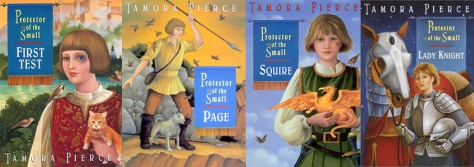
Protector of the Small begins the same year that The Immortals ends. Telling the story of the first girl to follow in Alanna’s footsteps, and to be able to do so openly, this is also a somewhat fast paced tale. Keladry of Mindelan was raised in the Yamani Islands, where women were not treated as if they were porcelain. Noble women learned to defend themselves. Kel knew she had it in her to be a warrior. With strong ideas of chivalry, Kel could never stand by if injustice was being done. She truly cares about people and takes her status as a noble, a protector of people, very seriously. She will stand up to bullies– whether they are village boys, a band of raiders, her fellow Pages, or a necromancer stealing children from their families– and make it her mission to take them down. Kel does not have an easy time as the only female page. The training master puts her on probation, firmly believing that girls cannot withstand the trials of becoming a knight. Some boys are cruel to her while others see that she stands up for them and thus back her when she goes looking to stop the bullies from hurting more people. Her hero, the Lioness, is forbidden to even say a word to her should Kel be accused of obtaining her shield through magical assistance.
Kel’s story is possibly my second most favorite of Pierce’s works. While I identify most with Daine, Kel faces even more adversity than Alanna. The Lioness did not have to face abuse towards her sex until she was an adult, and even then few were brave enough to hurl that abuse to her face. Kel must withstand it as a child. Kel had to face cruel hazing, the threat of sexual abuse towards her and her maid, the constant fight to prove herself, and the fear that she might be sent away even if she does as well as everyone else. This series is perfect for teachers to introduce to students that are suffering from bullying. I identified with Kel’s journey though not necessarily her character. I was bullied very badly as a youth and didn’t have Kel’s bravery to stand up for myself. If you’ve ever been in that position, then please read these books. You’ll find that you were not alone. Kel stands up to the bullies, fights back, and stays strong even when they conspire to stand in her way.
Reading these books after having read Daughter of the Lioness and Beka Cooper made me snicker when I found connections, like Alanna’s cat Faithful and Beka’s cat Pounce– the constellation made flesh to help the heroines; the Dancing Dove created in Beka’s time to be used still by her rogue descendant, George; and the consistent geography of Tortall. Some things were also explained. All the while reading Beka Cooper’s story, I wondered why the Goddess as the Gentle Mother was being brought up at every turn. This representation of the Goddess frowns upon women who fight, women who dirty themselves with violence, i.e women like all of Pierce’s heroines. During Beka Cooper’s time, there were Lady Knights as well as women working the Provost’s beat. The introduction of the Goddess as the Gentle Mother offers an explanation as to why Lady Knights were phased out over the years. There is still so much about these characters that I would love to know. How did George rise up to become the Rogue? What was he doing as Alanna earned her shield? What of Numair? How did he become a fugitive from Carthak? Of the Circle books, what the heck happened to Briar, Evvy, and Rosethorn in Yanjing? Too many questions Tammy! Fortunately, it seems that at least one question might be answered. It is rumored that Battle Magic, the story of the war Briar, Rosethorn, and Evvy witnessed and survived, will be released in February of 2013. Fingers crossed, folks!
On a final note, I will leave you with this theory: Emelan and Tortall are in the same universe, across the Endless Sea/Emerald Ocean from each other. Evidence? Not much besides neither world investing much in exploration past a certain point– in both worlds, islands famed for their copper export. Coincidence? Maybe. But how often does Pierce leave things to coincidence in a world guided by the gods?
Visit Tamora Pierce’s web site and learn more about her and her books!
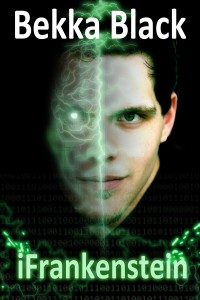 iFrankenstein takes the 1830’s story and launches it into the 21st century. It is told through text messages, e-mails, and even web sites. I find this to be perfect given that its inspiration was written as an epistolary novel (written in letters). It’s a wonderful nod to the original story. Victor Frankenstein is a brilliant young man who is stuck on a cruise with his father, his best friend’s mother, and Elizabeth. Too bad he’s too connected to realize that she’s there half the time. The focus of his online obsession is his chatbot project. If he can create a chatbot that can pass the Turing Test (respond in a way that a human would be unable to tell that it is talking to a robot), he will win a scholarship and be off to college a year early. This will mean his freedom. However, his brilliance runs away with him and the chatbot, Virtual Victor, is a little smarter than he realized.
iFrankenstein takes the 1830’s story and launches it into the 21st century. It is told through text messages, e-mails, and even web sites. I find this to be perfect given that its inspiration was written as an epistolary novel (written in letters). It’s a wonderful nod to the original story. Victor Frankenstein is a brilliant young man who is stuck on a cruise with his father, his best friend’s mother, and Elizabeth. Too bad he’s too connected to realize that she’s there half the time. The focus of his online obsession is his chatbot project. If he can create a chatbot that can pass the Turing Test (respond in a way that a human would be unable to tell that it is talking to a robot), he will win a scholarship and be off to college a year early. This will mean his freedom. However, his brilliance runs away with him and the chatbot, Virtual Victor, is a little smarter than he realized. The Hunger Games film adaptation was an interesting experience for me. It didn’t strike me as an adaptation as much as it was a companion. Many elements of the story were revealed to the reader through Katniss’ own thought process. Her deductive reasoning made sense for us. In a film, that would have been difficult to portray. So, they took a different route. Instead, we were shown what was going on outside of the arena. How did Seneca Crane make the decision to bend the rules? How did Haymitch build the support for Katniss? These were things we barely thought about as we read while we focused hard on Katniss and Peeta’s fight for survival. The film showed a great deal of the Capitol that we did not see through Katniss’ eyes. I found the film to be enjoyable because of this. It stood apart without being completely independent.
The Hunger Games film adaptation was an interesting experience for me. It didn’t strike me as an adaptation as much as it was a companion. Many elements of the story were revealed to the reader through Katniss’ own thought process. Her deductive reasoning made sense for us. In a film, that would have been difficult to portray. So, they took a different route. Instead, we were shown what was going on outside of the arena. How did Seneca Crane make the decision to bend the rules? How did Haymitch build the support for Katniss? These were things we barely thought about as we read while we focused hard on Katniss and Peeta’s fight for survival. The film showed a great deal of the Capitol that we did not see through Katniss’ eyes. I found the film to be enjoyable because of this. It stood apart without being completely independent. 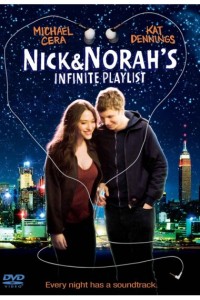 Nick and Norah’s Infinite Playlist, however, was a touch of a disappointment for me. This book was my bible. I carried it around in my bag and read random passages when I needed to slip between the pages and escape. The film had an amazing soundtrack, which given the book’s heavy musical influence was to be expected. Kat Dennings was brilliant as Norah, but I felt that Michael Cera ruined the character of Nick. I’m sorry, Cera. You were an awesome Scott Pilgrim, but you turned my wonderfully romantic Nick into a complete wuss. Sure, Nick was a touch Emo, but it was more about the music for him. Cera’s Nick was a complete mope with a serious case of the glooms. There were switches and additions that I appreciated, Caroline’s drunken escapade for example. I will always be sad that they left out “On Ludlow”, the improvised song Nick sings when he is left behind by Norah. Overall the film was “meh”, it didn’t leave me with the cathartic feeling of the book nor did I swoon after Nick. Damn you, Cera. Damn you.
Nick and Norah’s Infinite Playlist, however, was a touch of a disappointment for me. This book was my bible. I carried it around in my bag and read random passages when I needed to slip between the pages and escape. The film had an amazing soundtrack, which given the book’s heavy musical influence was to be expected. Kat Dennings was brilliant as Norah, but I felt that Michael Cera ruined the character of Nick. I’m sorry, Cera. You were an awesome Scott Pilgrim, but you turned my wonderfully romantic Nick into a complete wuss. Sure, Nick was a touch Emo, but it was more about the music for him. Cera’s Nick was a complete mope with a serious case of the glooms. There were switches and additions that I appreciated, Caroline’s drunken escapade for example. I will always be sad that they left out “On Ludlow”, the improvised song Nick sings when he is left behind by Norah. Overall the film was “meh”, it didn’t leave me with the cathartic feeling of the book nor did I swoon after Nick. Damn you, Cera. Damn you.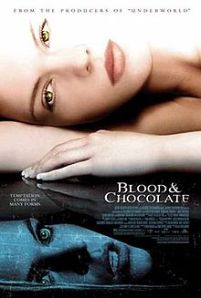 means to be one of the pack but yet still human at the same time. She is constantly at war with herself, consumed by the idea that she could be loved by a human for who she really is. The language is powerful, the characters are exciting, and the story does not end how you would expect. Now, have you ever seen the movie Blood and Chocolate? I don’t recommend it. The only thing in common between the book and film was the names of the characters and the title. It took place in a completely different country, the main character is older, the laws of the pack are completely different, and the dynamics of the characters are totally upended. It was painful for me to watch as a fan of the book. Had I never heard of the book, I’m sure the film would have been perfectly entertaining. However, I find that when you adapt a novel there should be more than a shred of similarity between the two.
means to be one of the pack but yet still human at the same time. She is constantly at war with herself, consumed by the idea that she could be loved by a human for who she really is. The language is powerful, the characters are exciting, and the story does not end how you would expect. Now, have you ever seen the movie Blood and Chocolate? I don’t recommend it. The only thing in common between the book and film was the names of the characters and the title. It took place in a completely different country, the main character is older, the laws of the pack are completely different, and the dynamics of the characters are totally upended. It was painful for me to watch as a fan of the book. Had I never heard of the book, I’m sure the film would have been perfectly entertaining. However, I find that when you adapt a novel there should be more than a shred of similarity between the two.

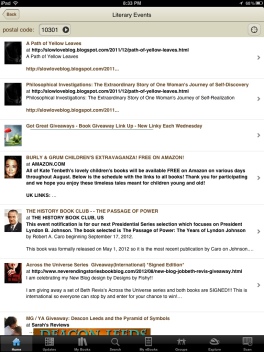



 experiences, and the friends we make set our normal lives light-years away. Reading can also create this phenomenon. When you live in the heads of these narrators for so long, your own life feels empty and distant. From What I Remember… is a literary example of this feeling, throwing three graduating seniors into a small Mexican town and into an action packed, romantic adventure where they each find something they were missing– all of this a day before their graduation. This is another gem by Stacy Kramer and Valerie Thomas, the same authors of
experiences, and the friends we make set our normal lives light-years away. Reading can also create this phenomenon. When you live in the heads of these narrators for so long, your own life feels empty and distant. From What I Remember… is a literary example of this feeling, throwing three graduating seniors into a small Mexican town and into an action packed, romantic adventure where they each find something they were missing– all of this a day before their graduation. This is another gem by Stacy Kramer and Valerie Thomas, the same authors of 